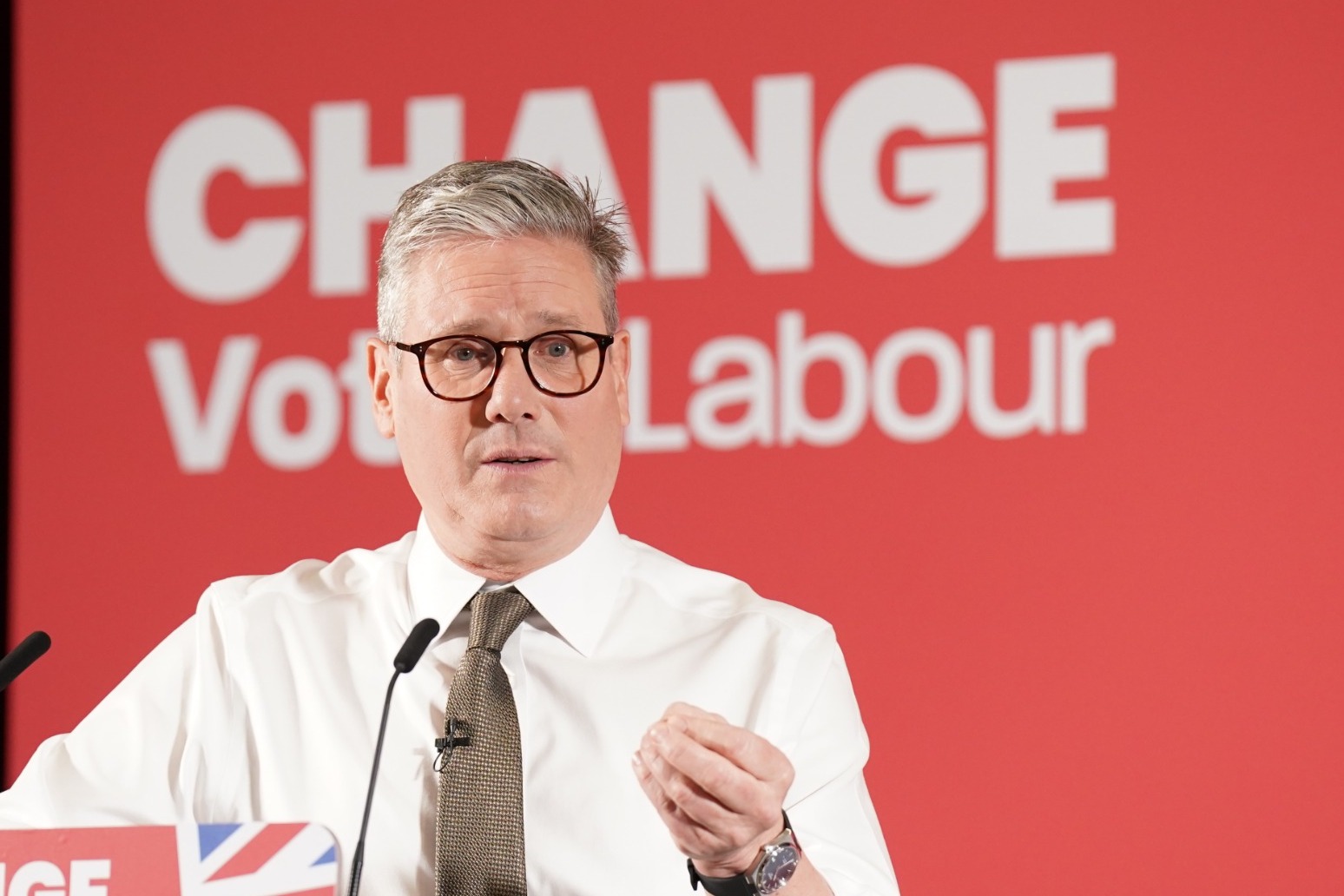
Starmer says trust me to end Tory ‘chaos’
The Labour leader has delivered his first keynote speech of the general election campaign
Sir Keir Starmer has said the General Election amounted to a choice about “whose side are you on” as he promised to stand up for working people and restore trust in British politics.
The Labour leader said 14 years of Conservative “chaos” had led to a “crisis” in the national culture.
In his first major speech of the campaign, he sought to persuade voters that he could be trusted to deliver economic stability and protect national security.
Speaking in Tory-held Lancing, West Sussex, he said: “Elections are about more than individual changes and policies, but about values, temperament, character and a bigger question: whose side are you on?
“Who do you hold in your mind’s eye when you are making decisions?
“Everything I have fought for has been shaped by my life, every change I have made to this party has been about a cause, the answer to that question, the only answer: The working people of this country delivering on their aspirations, earning their respect, serving their interests.”
Sir Keir acknowledged that despite Labour’s commanding opinion poll lead, many voters were not fully persuaded about his party.
“I know there are countless people who haven’t decided how they’ll vote in this election. They’re fed-up with the failure, chaos and division of the Tories, but they still have questions about us: has Labour changed enough? Do I trust them with my money, our borders, our security?
“My answer is yes, you can, because I have changed this party, permanently.”
In an attack on the Tory record, he said: “For a long time now, working people have believed opportunity in Britain is stacked against them.
“But now we are at a dangerous new point, close to crossing a Rubicon of trust, not just in politics but in many of the institutions that are meant to serve and protect the British people.
“A moment where people no longer believe their values or interests carry the respect of those in power.
“When you put that alongside a Government that over 14 years has left living standards in this country worse than when they found them, that has torched any semblance of standards in public life, Westminster parties that broke the rules they put in place to save lives and rules they expected you to follow but ignored themselves, then you get a crisis in nothing less than who we are as a nation.”
Sir Keir dismissed Rishi Sunak’s plan for a new form of compulsory national service as a “teenage Dad’s Army”.
He said the policy would be “paid for by cancelling levelling-up funding and money from tax avoidance that we would use to invest in our NHS”.
“All elections are a choice and this is a clear one: levelling-up and the NHS with Labour or more desperate chaos with the Tories.”
Mr Sunak responded to the speech by saying: “Our country needs bold action, not waffle.”
Tory chairman Richard Holden dismissed Sir Keir’s speech as “wearisome and rambling” with “no policy, no substance, and no plan”.
But Conservative ministers continued to come under pressure to give details about Mr Sunak’s national service scheme.
Foreign Office minister Anne-Marie Trevelyan did not rule out the possibility of parents facing prosecution if their adult children refused to take part in the scheme.
The mandatory nature of the scheme has been compared by the Conservatives to the requirement for children up to 18 to be in education or training. Parents are liable for fines if pupils do not show up to school.
Asked on Times Radio whether parents would face prosecution if their – legally adult – 18-year-olds refuse to sign up for the military or volunteering activity, she said: “I’m not going to write the detailed policy now. That’s what a royal commission programme of works will be for.”
The £2.5 billion policy is not expected to be fully implemented until 2028-29 if the Tories win the election.
Northern Ireland minister Steve Baker has said the national service plan was “sprung” upon Tory candidates.
Writing on social media, he suggested had it been a government policy, he would have had a say because of the particular sensitivities around Northern Ireland.
He said: “Government policy would have been developed by ministers on the advice of officials and collectively agreed. I would have had a say on behalf of NI.
“But this proposal was developed by a political adviser or advisers and sprung on candidates, some of whom are relevant ministers.”
In a sign of wider unease at the policy, he added: “History has proven time and time again that liberty under law – not compulsion and planning – is the surest road to peace and prosperity.”
Published: by Radio NewsHub